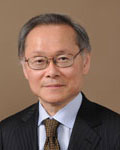- HOME
- Research
- Researcher's Profile
- Yutaka KONDO
Researcher's Profile

- Fellow
- Yutaka KONDO
- RCAST Fellow
- kondo.yutaka.bc
 gmail.com
gmail.com
Biography
| April 1977 | PhD, School of Science, University of Tokyo (UTokyo) |
|---|---|
| April 1989 | Associate Professor, Research Institute of Atmospherics, Nagoya University |
| April 1990 | Associate Professor, Solar Terrestrial Environment Laboratory, Nagoya University |
| April 1992 | Professor, Solar Terrestrial Environment Laboratory, Nagoya University |
| April 2000 | Professor, RCAST, Utokyo |
| April 2011 | Professor, Faculty of Science, UTokyo |
| April 2015 | Research Professor, National Institute of Polar Research |
| May 2015 | Professor Emeritus, UTokyo |
Research Interests
Global changes in the chemical composition of the atmosphere are making large impacts on the atmospheric environment and climate system. I have made investigations on atmospheric ozone and aerosols for many years. They have great influences on human activities and the climate system, respectively. I made observations of these components by developing advanced measurement techniques and elucidating key physical and chemical processes, through which human activities influence the atmospheric environment. Recent objectives of my studies have been the effects of aerosols on the climate in the Arctic. Many of these studies were conducted in close collaboration with NOAA and NASA.
Aerosols influence the radiation budget of the Earth via the direct effect (by scattering and absorption) and indirect effect (by changing properties of clouds). Inorganic and organic aerosols scatter solar radiation and contribute to atmospheric cooling. Black carbon aerosol (BC) emitted from incomplete combustion of carbon fuels strongly absorbs solar radiation and heats the atmosphere. Aerosols as a whole lead to global cooling. Therefore, reducing aerosols would accelerate global warming, depending on the emissions scenarios of aerosols and GHGs. I succeeded in measuring the distributions aerosols with high accuracy, which contributes to improving the estimates of the aerosol effects on climate by using Earth system models.
If the future reductions of GHGs turns out to be insufficient to mitigate global warming, the possibility of a climate crisis cannot be excluded. To avoid possible cascading impacts in the climate system, NOAA is conducting systematic studies of cooling the Earth by using aerosols, which is called solar radiation management (SRM). I plan to inform people in general of the latest knowledge on climate change science, including SRM, by organizing cooperation between RCAST and NOAA. This will contribute to deepening the understanding of people in general on climate change, which is necessary to minimize risks.
Award
- October 1986 Tanakadate Award(SGEPSS)
- October 1990 Horiuchi Award (Meteorological Society of Japan)
- May 2001 MSJ Award (Meteorological Society of Japan)
- May 2009 AGU Fellow (American Geophysical Union)
- November 2012 Medal with Purple Ribbon
- May 2013 Fujiwara Award (Meteorological Society of Japan)
- May 2014 JpGU Fellow
- June 2015 Japan Academy Prize
- April 2023 Order of the Sacred Treasure
Keywords
climate change, aerosol science, Solar Radiation Management

